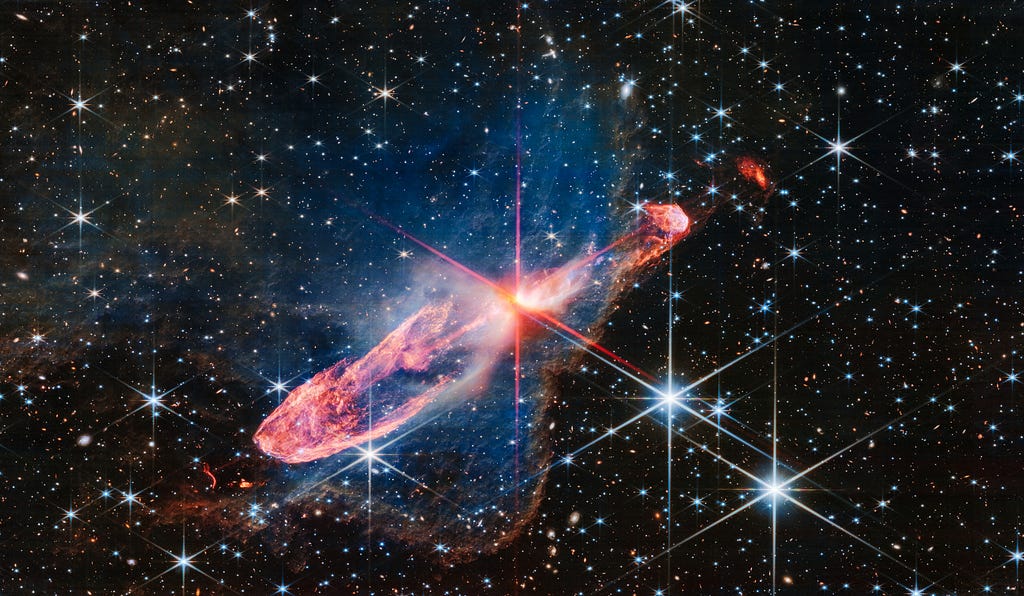
The quality of neural networks depends on their training data set. This applies to both natural and artificial networks. Today’s young generation is eager to protest unreasonably because it does not have a good sense of history, nor a balanced perspective of the risks from bad actors. Similarly, artificial intelligence (AI) systems without the latest advances in reasoning tend to hallucinate.
When the human species emerged in Africa a few million years ago, the idea of migrating from one location to another was as ambitious as Elon Musk’s vision of migrating from Earth to Mars. Both reflect goals shaped by the limited data sets of their time.
Mars was hospitable to life-as-we-know-it a few billion years ago before it lost its atmosphere and became a desert with no atmosphere or liquid water on its surface. Envisioning a human migration to Mars stems from migrations on Earth. Imagining what lies beyond the Solar system is a qualitatively new challenge.
Most stars carry a tenth of the mass of the Sun. The rocky planets in their habitable zone manifest conditions that deviate well beyond our terrestrial experiences. It is possible that most intelligent beings in our cosmic neighborhood look and think differently from us. If so, when we encounter their technological products, we might be surprised. It is important for us to study these products in order to train ourselves on data that may exceed our imagination.
The limits of our terrestrial experiences are of great concern to me, as I get paid to think about the sky. My job is to look up where most of the cosmic real estate is located. From my perspective, alien intelligence — an extension of AI — encompasses neural networks that emerged on exoplanets as well, not only on Earth.
“Are we alone?” is the most romantic question in science. It is also the question that will have the biggest impact on the future of humanity because it will expand our training data set on Earth. The most accomplished alien civilizations are likely to possess superhuman capabilities. As an optimist, I view the encounter with them as an opportunity to grow our training data set. We can learn from smarter kids on our cosmic block, as long as they do not seek to harm us or masquerade as a Trojan horse.
If aliens will offer to save us from our current existential threats, should we let them do it or decline their offer? If they are evidently superior to us, I would approach the offer with hope. Alleviating our cosmic loneliness with a wiser partner, can make us better. My sentiment was shared in recent conversations I had with the brilliant actors Margot Robbie and Adrien Brody, who agreed that aliens are likely to be both real and helpful. Our geopolitical missteps provide frequent testimonies to the fact that we are not the pinnacle of creation. There is room for improvement.
There are about 100 billion stars in the Milky Way, similar to the number of people who ever lived on Earth. This means that each of us can be assigned a star. Since most stars were born billions of years before the Sun, humans are probably not at the top of the interstellar food chain. It is arrogant to think otherwise.
Will the encounter with extraterrestrials pose a threat to religion? Probably not. When my second daughter was born, she did not take away any of my love for my first daughter. It is demeaning to imagine that God can only attend to one civilization in the cosmos. Moreover, encountering advanced technological artifacts could trigger a sense of religious awe, similar to what Moses felt when he witnessed the burning bush that was not consumed.
We should be guided by curiosity and never pretend to know the answer in advance. Humility would allow us to enlarge our limited training data set beyond our past experiences on Earth.
The more encounters we have with extraterrestrials, the more expansive our imagination will be. For this reason, the search for technological objects near Earth should have received top priority within the mainstream of astronomy. Instead, billions of dollars are allocated to the search for microbes, while the search for extraterrestrial artifacts does not receive any federal funding at the moment.
Despite that, materials and information on extraterrestrial technologies may have been collected over the years by the U.S. Department of Defense which is tasked to protect our national security. The existence of Unidentified Anomalous Phenomena (UAPs) implies that this task is not fully fulfilled despite the trillion dollars allocated to defense in Fiscal year 2026. The secrecy surrounding government data on UAPs protects incompetence from public scrutiny. In my recent congressional briefing on May 1, 2025, I argued that a billion-dollar investment in UAP research, which is only 0.1% of the annual defense budget and 10% of the budget allocated to the search for microbes with the planned Habitable World Observatory, could attract the best scientists to the project aiming to resolve the nature of UAPs in the spirit of the Manhattan Project. It is not sufficient to have expensive sensors that collect state-of-the-art data. In fact, it is more important to employ the best scientist to analyze the data and develop the AI tools that will properly tag outliers and interpret them. After all, investing a large sum of money in a basketball court is not a guarantee for exceptional game play. For that, one needs to employ exceptional players.
Ultimately, we can only collect data from the observable volume of the Universe, namely the volume through which light traveled since the Big Bang, 13.8 billion years ago. What lies beyond our cosmic horizon today will not influence our future because of the accelerated cosmic expansion. But there might be rare brilliant civilizations that drastically exceed our expectations beyond our cosmic horizon. Somewhere in the multiverse, there might be quantum-gravity engineers capable of creating baby universes. Perhaps one of them created our Big Bang. That might constitute the most imaginative act that we had ever encountered.
ABOUT THE AUTHOR

Avi Loeb is the head of the Galileo Project, founding director of Harvard University’s — Black Hole Initiative, director of the Institute for Theory and Computation at the Harvard-Smithsonian Center for Astrophysics, and the former chair of the astronomy department at Harvard University (2011–2020). He is a former member of the President’s Council of Advisors on Science and Technology and a former chair of the Board on Physics and Astronomy of the National Academies. He is the bestselling author of “Extraterrestrial: The First Sign of Intelligent Life Beyond Earth” and a co-author of the textbook “Life in the Cosmos”, both published in 2021. The paperback edition of his new book, titled “Interstellar”, was published in August 2024.